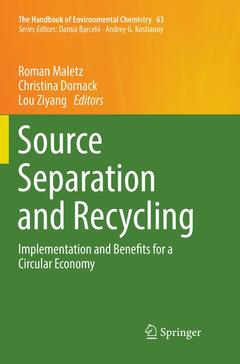Description
Source Separation and Recycling, Softcover reprint of the original 1st ed. 2018
Implementation and Benefits for a Circular Economy
The Handbook of Environmental Chemistry Series, Vol. 63
Coordinators: Maletz Roman, Dornack Christina, Ziyang Lou
Language: English
Subjects for Source Separation and Recycling:
Publication date: 02-2019
318 p. · 15.5x23.5 cm · Paperback
Publication date: 03-2018
Support: Print on demand
Description
/li>Contents
/li>Biography
/li>Comment
/li>
Source separation of waste and subsequent recycling processes are promising solutions on the road to a circular economy. They reduce waste disposal and the need for resource deployment, while also producing secondary raw materials; as such, they have a significant effect on climate protection.
This book presents source separation technologies and related aspects that form the basis for efficient recycling and a modern approach to waste management. It examines legislational drivers and policy aspects of adequate waste collection schemes, as well as segregation technologies and the success factors for their implementation.
Summarizing the outcomes of a Sino-German workshop, the focus of this volume is mainly on the current situation in China and Germany. However, the findings are applicable to a broad range of situations and regions around the world. In addition, the book demonstrates the relevance of source separation for climate protection and describes alternative separation technologies.
Given the breadth and depth of its coverage, the volume will appeal to environmental scientists, engineers, economists, waste managers and policymakers alike.
Roman Maletz
Technische Universität Dresden
Fakultät Umweltwissenschaften
Institut für Abfall- und Kreislaufwirtschaft
Pratzschwitzer Str. 15
01796 Pirna, Germany
roman.maletz@tu-dresden.de
Christina Dornack
Technische Universität Dresden
Fakultät Umweltwissenschaften
Institut für Abfall- und Kreislaufwirtschaft
Pratzschwitzer Str. 15
01796 Pirna, Germany
christina.dornack@tu-dresden.de
Lou Ziyang
School of Environmental Science and Engineering
Shanghai Jiao Tong University
Shanghai 200240, China
louworld12@sjtu.edu.cn
These books may interest you

Tire Waste and Recycling 242.37 €



